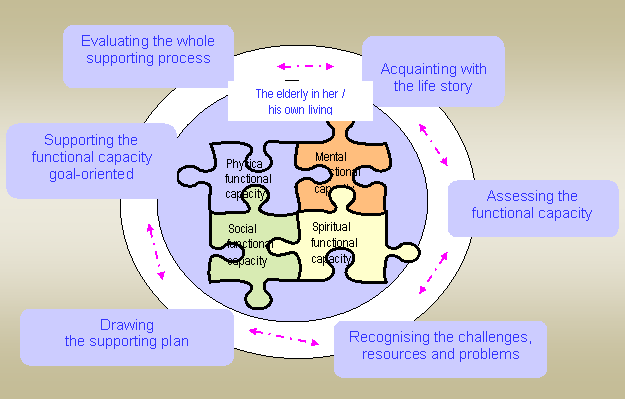
SUPPORTING PROCESS
The process of supporting the functional capacity of older people
The supporting process of the functional capacity means elderly-oriented holistic care. The carer works in close cooperation with the elderly all the time. The elderly is an active actor and makes decisions concerning him / her and the care and the supporting of the functional capacity. The carer clarifies to the elderly the supporting process and the phases and the methods. This way the elderly commits to his / her supporting of the functional capacity.
In holistic and systemic supporting of the functional capacity of older people the carer understands the whole supporting process. This process logically consists of care and nursing actions and multiprofessional resources, which enable to achieve the set objectives. The supporting process is qualitative when the carer is masters the collecting and writing down the life story, the holistic assessments of the functional capacity, drawing up the care plan for supporting and versatile methods and activities for supporting the functional capacity.
The professional skills of the carer are based of the continuous development of the care process. The carer needs lifelong learning because the society, environment and work change continuously. The work requires the carer holistic, dynamic expertise, adjustable specialization and understanding of the whole care process.

Figure. The process of supporting the functional capacity
The first phase of the process is to get acquainted with the life story of the elderly. The aim is to help the carer to understand and the elderly her- / himself and the current situation of the functional capacity. In the second phase the carer assesses the functional capacity on all the areas; physical, mental, social and spiritual. The aim is to recognise the problems and the resources related to the functional capacity. In the next phase the carer draws together with the elderly the care plan for supporting the functional capacity. The aim is to write down concretely and clearly all the problems and resources and the aims concerning them. Also the co-operation and division of work are written down. With the help of the care plan the carer is able to the daily life and the functional capacity of the elderly goal-oriented. To be able to do the supporting with quality the carer needs to understand the process and good skills and continuous training of qualitative methods and activities for supporting. The whole process must be evaluated systematically in all its phases, because it guarantees the qualitative process of supporting the functional capacity.
The elderly’s living environment changes during the life span. It can be a home, a homely care environment or an institution. The living environment can support the functional capacity if it is activating, unobstructed, calming and safe. The environment can be also harm the functional capacity if it is obstructed, unsafe, unpleasant and poor in activities.
The phases of the supporting process are in close interaction and though the phases follow each other, the carer must return to the earlier phases to be able to deepen own understanding of the functional capacity and the supporting of the elderly.
The goal of professional care of older people is to improve the well-being, functional capacity and quality of life, increase the feeling of coherence and safety and create possibilities for meaningful activities and participation in society as an equal citizen. In care of older people the problems and resources are recognised and after that the carer plans together with the elderly the supporting activities. It is important that the carer learns to use methods and activities that both support the resources and decrease problems. The core of the care work is holistic supporting of different older people.